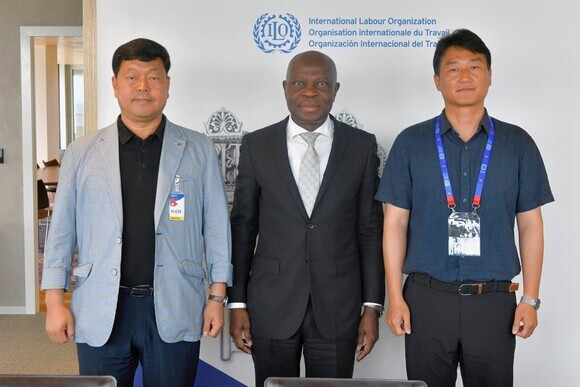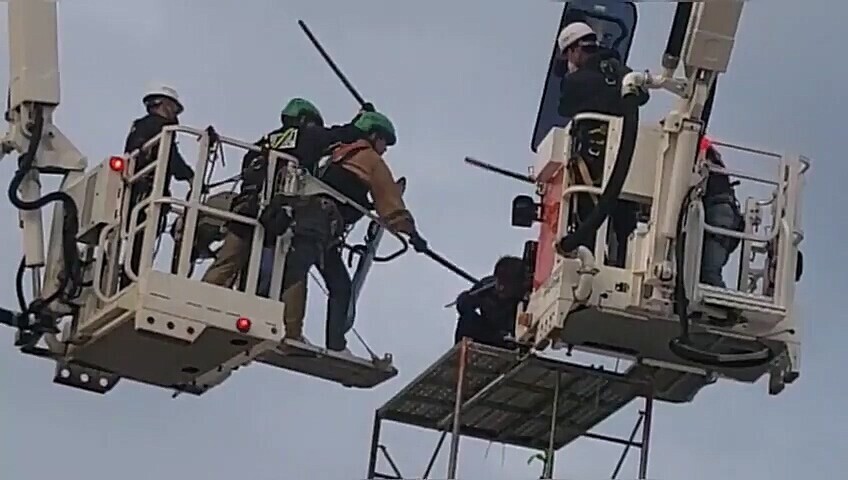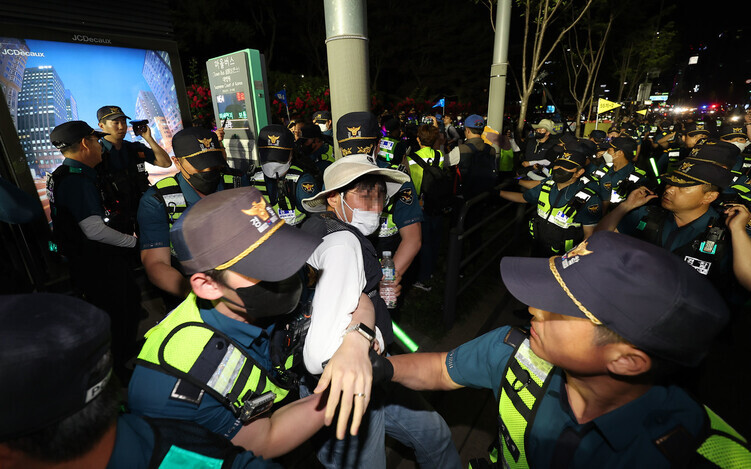hankyoreh
Links to other country sites 다른 나라 사이트 링크
ILO chief says he is closely watching labor union persecution in S. Korea

Gilbert F. Houngbo, director-general of the International Labour Organization (ILO), made remarks Sunday criticizing what he characterized as a very severe situation of organized labor repression under the administration of South Korean President Yoon Suk-yeol.
Expressing astonishment at reports of the tactics used in suppressing last year’s strike by the Cargo Truckers’ Solidarity Division (TruckSol), he explained that he had been observing the South Korean situation closely ever since.
At the 111th session of the International Labour Conference in Geneva that day, Houngbo met with Korean Confederation of Trade Unions (KCTU) leader Yang Kyeung-soo and Federation of Korean Trade Unions (FKTU) Secretary-General Ryu Ki-seob, explaining to them that he had learned about the severity of the South Korean situation from their accounts, among other sources.
He went on to say that the matters in question had been referred by petition to the ILO’s Committee on Freedom of Association, where procedures are currently underway. He added that suitable measures would be taken once the findings emerge.
Four cases have been submitted against the South Korean government with the Committee on Freedom of Association, which is the ILO’s oversight body. They concern matters such as restrictions on TruckSol’s strike rights, suppressions of the Korean Construction Workers Union (KCWU), and the neutralizing of collective bargaining rights for public institutions through the use of budget management guidelines.
Also present at the meeting was Maria Helena André, director of the ILO’s Bureau for Workers’ Activities, who explained that regular oversight and monitoring procedures would be initiated this year for compliance with ILO Convention 87 on freedom of association and protection of the right to organize and Convention 98 on the right to organize and collective bargaining.
With the matter already under review due to the complaints, André promised to ensure the ILO’s warning message is conveyed effectively based on monitoring and oversight procedures.

During the meeting, Yang explained, “Since its suppression of the TruckSol strike late last year, the [Yoon] administration has recently been waging a large-scale attack on the KCWU, while labor-management relations are deteriorating to a level on par with the dictatorship era 30 years ago.”
“The government is not listening at all to what the labor unions are saying, and social dialogue has been cut off completely,” he lamented, while calling for ILO intervention.
Ryu said, “During the strike, the administration was working to develop labor policies that incorporated things the employers had long been wanting, such as replacement work permissions and concentrated use of overtime hours, which promotes overwork, and it has regarded the labor unions as an obstacle to that.”
“Rather than applying any sort of rigorous standard on illegal and unfair actions by employers, they have been attacking the labor unions alone,” he added.
During the session on Monday, representatives of South Korea’s labor, management, and government spoke at a roundtable on Houngbo’s report entitled “Advancing Social Justice.”
As a representative of organized labor, Yang referred to the self-immolation of construction worker Yang Hoe-dong on May Day.
“The destruction of dignity that drove him to his death is being perpetrated in the name of ‘the rule of law,’” he said.
“The administration has said this means that labor and management alike should abide by the law, but we don’t see any employers getting arrested or summoned,” he continued.
“This isn’t the rule of the law — it’s abusing the law as a means of suppressing workers.”

He went on to mention police’s brutal tactics in bringing a Korean Metal Workers’ Union official down from an aerial protest, the exclusion of the two labor confederations from government committees, and the overt administration pressure that is being applied over union accounting practices.
“The starting point for advancing social justice comes when they stop this persecution and release the workers who have been detained,” he stressed.
Speaking as a representative of the business world, Korea Enterprises Federation Vice Chairperson Lee Dong-geun defended the administration’s tactics.
“The South Korean labor world’s claims of government persecution of labor are contrary to the facts, and there is a growing mood in society that people cannot support aggressive strikes and illegal actions by labor,” he said.
“If anything, the South Korean government is ensuring the rule of law for both labor and management according to the law and principles,” he insisted.
As a representative of the South Korean government, Vice Minister of Employment and Labor Kwon Gi-seob said, “To successfully bring labor reforms to completion, not only the administration but labor and management too must bear social responsibility in line with their influence.”
“They need to break free of their old practices of relying on the logic of power and struggle to solve problems, rather than dialogue and compromise,” he stressed.
At the same time, he said the administration was “working to establish the rule of law in the labor market and to encourage labor and management to resolve matters such as the dual labor market structure based on cooperation and dialogue.”
By Kim Hae-jeong, staff reporter
Please direct questions or comments to [english@hani.co.kr]

Editorial・opinion
![[Column] Tariffs on China: Trump was dumb, Biden dumber [Column] Tariffs on China: Trump was dumb, Biden dumber](https://flexible.img.hani.co.kr/flexible/normal/500/300/imgdb/original/2024/0520/191716191153918.jpg) [Column] Tariffs on China: Trump was dumb, Biden dumber
[Column] Tariffs on China: Trump was dumb, Biden dumber![[Column] What if Seoul took reunification by force off the table? [Column] What if Seoul took reunification by force off the table?](https://flexible.img.hani.co.kr/flexible/normal/500/300/imgdb/original/2024/0520/3017161928630494.jpg) [Column] What if Seoul took reunification by force off the table?
[Column] What if Seoul took reunification by force off the table?- [Editorial] Intensifying US-China rivalry means Seoul must address uncertainty with Beijing sooner than later
- [Column] When ‘fairness’ means hate and violence
- [Editorial] Yoon must stop abusing authority to shield himself from investigation
- [Column] US troop withdrawal from Korea could be the Acheson Line all over
- [Column] How to win back readers who’ve turned to YouTube for news
- [Column] Welcome to the president’s pity party
- [Editorial] Korea must respond firmly to Japan’s attempt to usurp Line
- [Editorial] Transfers of prosecutors investigating Korea’s first lady send chilling message
Most viewed articles
- 1To weigh costs and benefits, Korea must stop treating US troop presence as a sacred cow
- 2Kim Jong-un wanted to meet with residents of shelled Yeonpyeong Island in South, Moon recalls in mem
- 3New doc undoes stereotypes of N. Korea with candid portraits of women’s football legends
- 43 months into doctors strike, finding an emergency room in Korea is harder than ever
- 588% of Chinese firms would rather work with Korean partners than Japanese ones, survey finds
- 6[Column] What if Seoul took reunification by force off the table?
- 7[Column] Tariffs on China: Trump was dumb, Biden dumber
- 8Xi, Putin ‘oppose acts of military intimidation’ against N. Korea by US in joint statement
- 9Unification minister says trusting intent of N. Korea could lead to ‘miscalculation,’ criticizing Mo
- 10Berlin mayor hints at tearing down ‘comfort women’ memorial in city